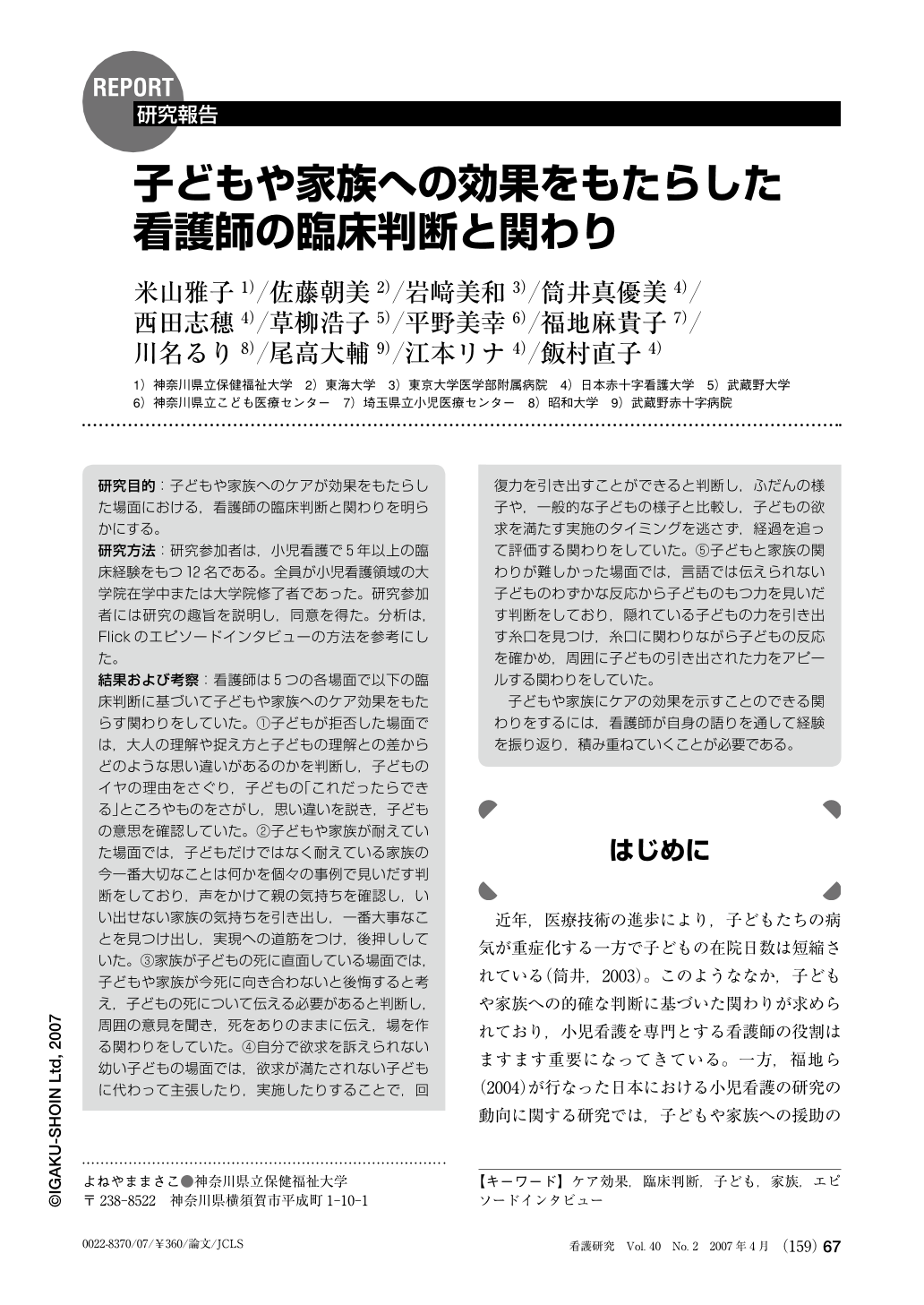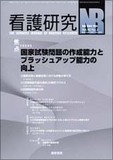Japanese
English
- 有料閲覧
- Abstract 文献概要
- 1ページ目 Look Inside
- 参考文献 Reference
- サイト内被引用 Cited by
研究目的:子どもや家族へのケアが効果をもたらした場面における,看護師の臨床判断と関わりを明らかにする。
研究方法:研究参加者は,小児看護で5年以上の臨床経験をもつ12名である。全員が小児看護領域の大学院在学中または大学院修了者であった。研究参加者には研究の趣旨を説明し,同意を得た。分析は,Flickのエピソードインタビューの方法を参考にした。
結果および考察:看護師は5つの各場面で以下の臨床判断に基づいて子どもや家族へのケア効果をもたらす関わりをしていた。①子どもが拒否した場面では,大人の理解や捉え方と子どもの理解との差からどのような思い違いがあるのかを判断し,子どものイヤの理由をさぐり,子どもの「これだったらできる」ところやものをさがし,思い違いを説き,子どもの意思を確認していた。②子どもや家族が耐えていた場面では,子どもだけではなく耐えている家族の今一番大切なことは何かを個々の事例で見いだす判断をしており,声をかけて親の気持ちを確認し,いい出せない家族の気持ちを引き出し,一番大事なことを見つけ出し,実現への道筋をつけ,後押ししていた。③家族が子どもの死に直面している場面では,子どもや家族が今死に向き合わないと後悔すると考え,子どもの死について伝える必要があると判断し,周囲の意見を聞き,死をありのままに伝え,場を作る関わりをしていた。④自分で欲求を訴えられない幼い子どもの場面では,欲求が満たされない子どもに代わって主張したり,実施したりすることで,回復力を引き出すことができると判断し,ふだんの様子や,一般的な子どもの様子と比較し,子どもの欲求を満たす実施のタイミングを逃さず,経過を追って評価する関わりをしていた。⑤子どもと家族の関わりが難しかった場面では,言語では伝えられない子どものわずかな反応から子どものもつ力を見いだす判断をしており,隠れている子どもの力を引き出す糸口を見つけ,糸口に関わりながら子どもの反応を確かめ,周囲に子どもの引き出された力をアピールする関わりをしていた。
子どもや家族にケアの効果を示すことのできる関わりをするには,看護師が自身の語りを通して経験を振り返り,積み重ねていくことが必要である。
[Purpose] The objective of this study is to describe clinical judgments and nursing actions in the effective care for children and their families.
[Method] Twelve pediatric nurses, all either graduate students or master's degree holders, with five years of clinical experience or more, were participated in this study. They were informed of the purpose and outline of the study and signed in. Flick's episodic interview method was used for the analyses.
[Findings and Discussion] Clinical judgments and nursing actions were categorized into five groups :
1) In the situations where children refused the nursing care, nurses recognized the gaps between adults' perception and their understanding. Nurses tried to find out the reason of the refusal, explore the way that they could cope with, explain their misunderstanding, and confirm their will.
2) In the situations where children and their family were at a loss what to do, nurses judged the most important thing for them as well as for the family. And nurses supported them to find it out and carry it out. Also nurses tried to listen and confirm the restrained feelings of the family, set the necessary steps to realize it, and prompt them to do it.
3) In the situations where children were going to die, nurses recognized that their family would totally regret if they did not face it, and that nurses had to tell the truth to the family. So nurses tried to listen to other nurses' opinions, inform the family of the truth, and set up the final occasion for children and family to spend together.
4) In the situations where children being incapable to communicate were frustrated, nurses recognized that standing up for them would promote their recovery. So nurses observed their condition, seize on the chance to fulfill their demands, and kept evaluating.
5) Even in the situations where nurses felt most difficult nursing case, nurses tried to find out the children's hidden abilities in obscure signs, confirm their responses, and inform it to the other staff.
To accomplish effective nursing actions, nurses need to accumulate and reflect on their experiences through their own narratives.

Copyright © 2007, Igaku-Shoin Ltd. All rights reserved.


